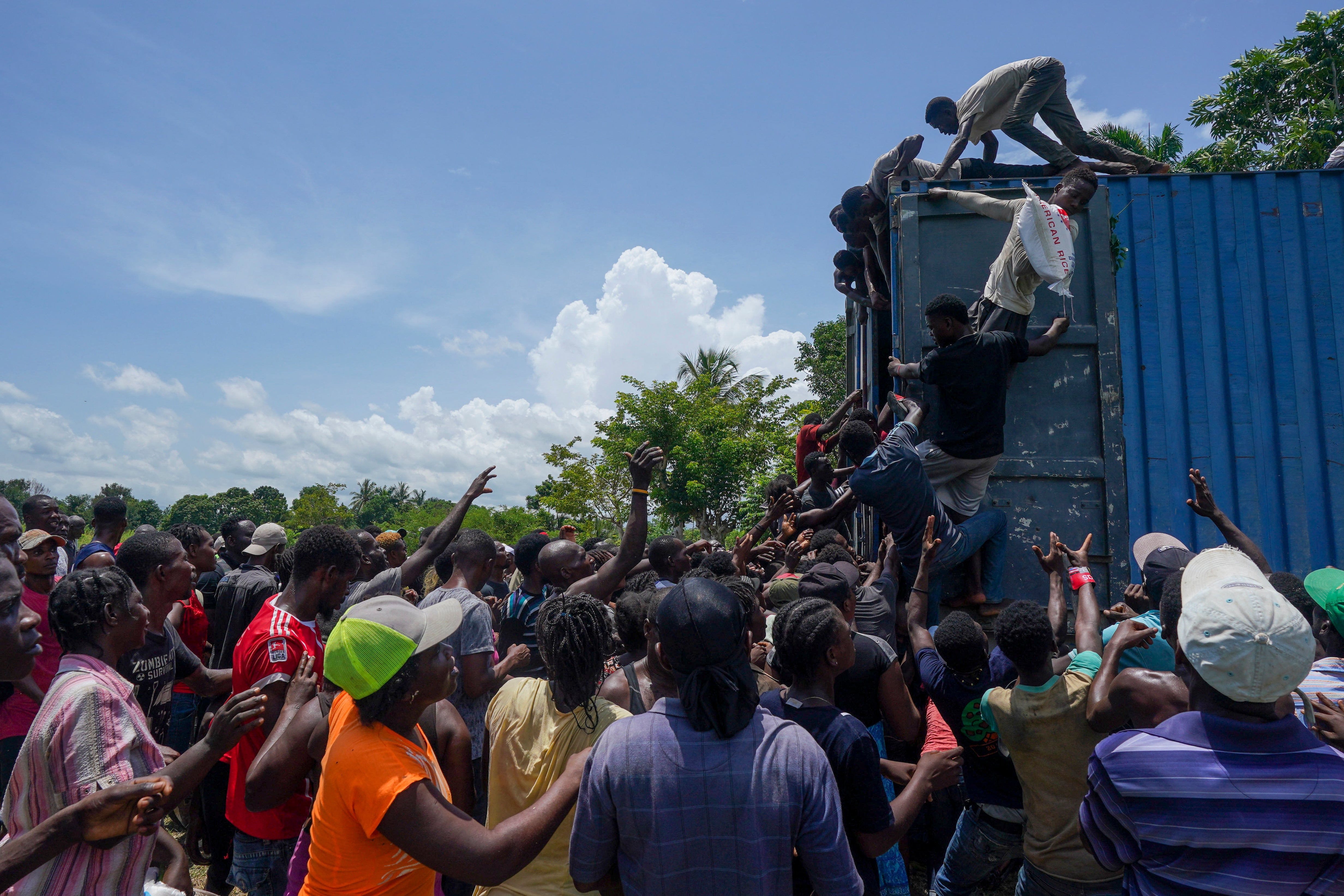Quake zone Haitians crowd relief shipments, some steal goods
Haitians who have endured hunger and no roof over their heads since a devastating earthquake left them homeless are rushing relief shipment trucks and in some cases looting desperately needed supplies

Your support helps us to tell the story
From reproductive rights to climate change to Big Tech, The Independent is on the ground when the story is developing. Whether it's investigating the financials of Elon Musk's pro-Trump PAC or producing our latest documentary, 'The A Word', which shines a light on the American women fighting for reproductive rights, we know how important it is to parse out the facts from the messaging.
At such a critical moment in US history, we need reporters on the ground. Your donation allows us to keep sending journalists to speak to both sides of the story.
The Independent is trusted by Americans across the entire political spectrum. And unlike many other quality news outlets, we choose not to lock Americans out of our reporting and analysis with paywalls. We believe quality journalism should be available to everyone, paid for by those who can afford it.
Your support makes all the difference.Hungry and homeless Haitians who have been sleeping outside since a devastating earthquake hit a week ago crowded relief trucks on Friday and some stole desperately needed goods from the vehicles, according to officials and an Associated Press photographer who witnessed one of the events.
The attacks on relief shipments illustrated the rising frustration of those left homeless after the Aug. 14 magnitude 7.2 earthquake, which killed nearly 2,200 people, injured more than 12,000 and destroyed or damaged more than 100,000 homes.
“I have been here since yesterday, not able to do anything,” said 23-year-old Sophonie Numa, who waited outside an international aid distribution site in the city of Camp-Perrin, located in the hard-hit southwestern Les Cayes region. “I have other people waiting for me to come back with something.”
Numa said her home was destroyed in the quake and that her sister broke her leg during the temblor.
“The food would help me a lot with the kids and my sister,” she said.
George Prosper was also in the large, anxious crowd awaiting aid.
“I am a victim. I was removed from under the debris,” the 80-year-old Prosper told the AP. “I don't feel well standing up right now. I can barely hold myself up.”
In the small port city of Les Cayes, an AP photographer saw people stealing foam sleeping pads from a truck parked at a Red Cross compound, while others looted food that was slated for distribution, said Jean-Michel Saba, an official with the country's civil protection agency. One man who made away with a parcel of food was immediately surrounded by others who tried to grab it away from him. Police managed to safely escort the food truck away, Saba said. He did not say how much was taken.
Similar looting appeared to take place in the small town of Vye Yerre near Les Cayes, where an AP photographer witnessed a group of men pulling large sacks from a half-opened container truck. Others then grabbed the sacks and rushed away.
The frustration over the pace of aid has been rising for days and has been illustrated by the growing number of people crowding together at aid distribution sites. But Friday was the first time there was such widespread looting.
Complicating matters, officials began restricting access to the bridge connecting Les Cayes to the small, quake-impacted port city of Jeremie, meaning aid distribution had to be delivered there by boat or plane.
The quake wiped out many of the sources of food and income that the poor depend on for survival in Haiti, which is already struggling with the coronavirus, gang violence and the July 7 assassination of President Jovenel Moïse. Most of the devastation happened in Haiti's already impoverished southwestern region.
Pressure for coordinated aid efforts mounted this week as more bodies were pulled from the rubble and the injured continued to arrive from remote areas in search of medical care.
International aid workers on the ground said hospitals in the areas worst hit by the quake are mostly incapacitated and that there is a desperate need for medical equipment.
Prime Minister Ariel Henry on Friday asked international governments and aid groups to funnel all of their donations through the country's civil protection agency, “which will specify the needs of each town, each village and each remote area not yet attended.”
Henry said earlier this week that his administration will work to not “repeat history on the mismanagement and coordination of aid,” a reference to the chaos that followed the country’s devastating 2010 earthquake, when the government was accused of not getting all of the money raised by donors to the people who needed it.
In a message on his Twitter account, Henry said that he “personally” will ensure that the aid gets to the victims this time around.
The Core Group, a coalition of key international diplomats from the United States and other nations that monitors Haiti, said in a statement Wednesday that its members are “resolutely committed to working alongside national and local authorities to ensure that impacted people and areas receive adequate assistance as soon as possible.”
____
Associated Press writers Fernando Llano in Vye Yerre, Haiti; Alan Clendenning in Newbury, Vermont; and Lisa J. Adams Wagner in Evans, Georgia contributed to this report.